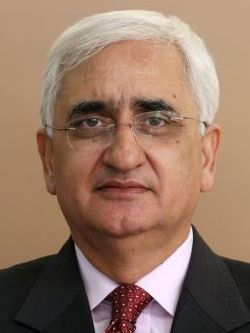In the wake of several lost tenders India's No. 1 weapons supplier, Russia, is likely to change tactics in its efforts to compete, a senior official in New Delhi said.
Moscow is "livid" and quite concerned about losing several big ticket Indian defense contracts recently, the official said in an interview, on condition of anonymity because he is not authorized to speak to the media.
Russian officials have said they will change their strategy and focus mainly on government-to-government defense purchase contracts that do not involve competitive bidding, rather than continue to be outmaneuvered in deals on the Indian defense market which are increasingly taking the form of highly competitive global tenders, according to the Indian source, who is close to bilateral discussions on the topic.
 Foreign Affairs Minister Kurshid
Foreign Affairs Minister Kurshid
Wikipedia
By leveraging the considerable political and diplomatic clout that Moscow has with New Delhi, Russia believes it will be better able to get a large share of some of the sizable contracts awarded directly by the government, as opposed to those resulting from competitive tenders issued by major Indian defense firms, the source said.
Commenting in an interview with Kommersant last week on Russia's options as a defense industry supplier, Indian Foreign Affairs Minister Salman Kurshid said, "There are strategic spheres in which intergovernmental agreements are still important. But in open societies, such as ours, it is important that there be transparency and public scrutiny, provided for by tenders."
However, India is likely to sign an intergovernmental contract with Russia for three more Talwar class frigates after next month's expected delivery of the frigate Trikand — the final ship to be delivered under a contract signed in 2006 to build three frigates for $ 1.6 billion. The new deal for the frigates is estimated to cost more than $2 billion.
Another bilateral deal signed in December 2012 will see Russia sell India 71 MI-17 V-5 military helicopters worth $1.3 billion and $1.6 billion worth of kits so India can assemble 42 Sukhoi SU-30MKI fighter aircraft.
The Russians have cited the example of the United States' approach to arms sales in India. Moscow believes that much of the current U.S. portfolio of $20 billion of orders in India is because of the very close strategic ties between those two countries.
The Americans have sold defense equipment to India worth around $8 billion in the past five years alone. All these contracts have been under Washington's foreign military sales program — which is effectively a government-to-government route.
Russian officials have told their Indian counterparts that they are taking a lesson from the results of the past two years in doing business with the burgeoning Indian defense industry.
Israeli, American and European companies have won out over Russian bids in many big-ticket Indian defense deals. In several cases, Russian companies did not even manage to be among the top three international companies shortlisted. In some instances the Russians were knocked out of the competition in the preliminary stage.
One case involved the Medium Multi Role Combat Aircraft, or MMRCA deal, whose total value is expected to be around $ 20 billion. Russia's Mikoyan MiG 35 was one of the six aircraft that participated in the MMRCA tender but did not make the shortlist, which contained the Eurofighter Typhoon and Dassault Rafale. The latter won the deal.
Russia is also miffed that a small country like Israel has become India's second largest defense supplier, the Indian official said. The Israelis have managed to bag orders worth $10 billion from the Indians in past decade — many of these through the government-to-government route.
Both Israel and No. 3 weapons supplier the United States are breathing down the necks of the Russians and may soon dislodge Moscow from the pole position if more big deals go awry for the Russians.
Contact the author at bizreporter@imedia.ru
A Message from The Moscow Times:
Dear readers,
We are facing unprecedented challenges. Russia's Prosecutor General's Office has designated The Moscow Times as an "undesirable" organization, criminalizing our work and putting our staff at risk of prosecution. This follows our earlier unjust labeling as a "foreign agent."
These actions are direct attempts to silence independent journalism in Russia. The authorities claim our work "discredits the decisions of the Russian leadership." We see things differently: we strive to provide accurate, unbiased reporting on Russia.
We, the journalists of The Moscow Times, refuse to be silenced. But to continue our work, we need your help.
Your support, no matter how small, makes a world of difference. If you can, please support us monthly starting from just $2. It's quick to set up, and every contribution makes a significant impact.
By supporting The Moscow Times, you're defending open, independent journalism in the face of repression. Thank you for standing with us.
Remind me later.





